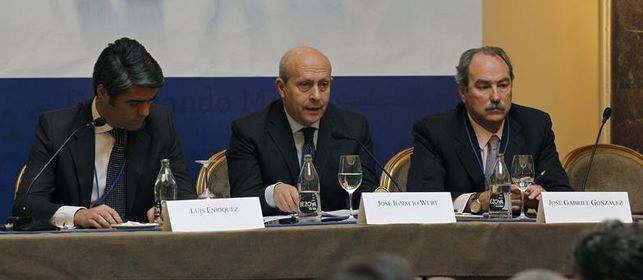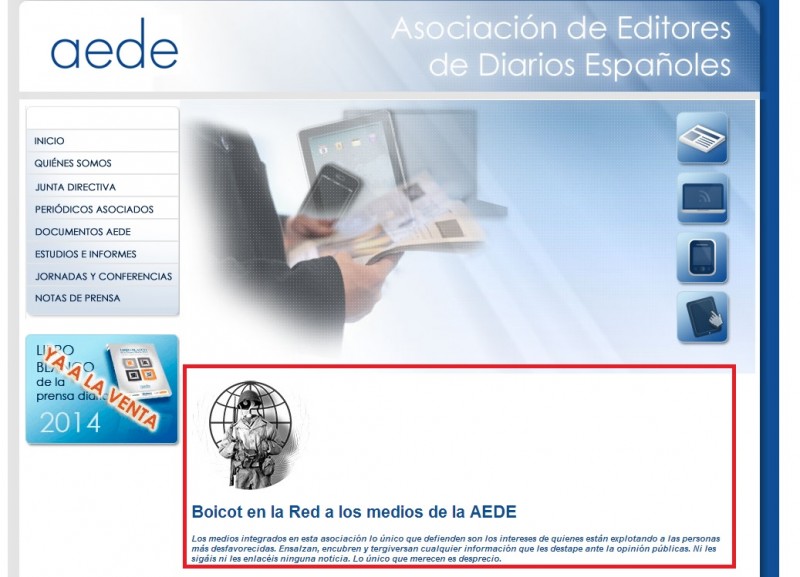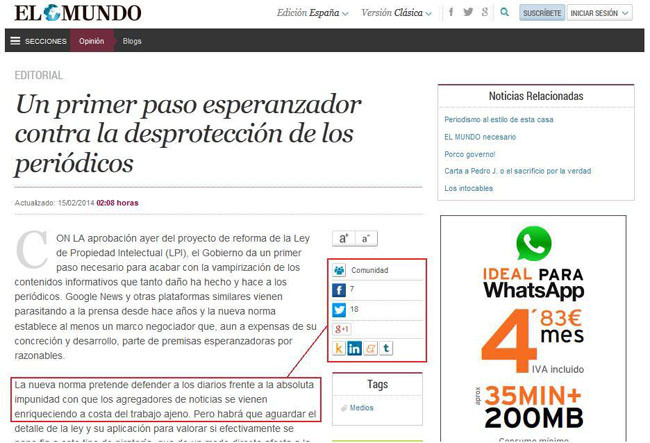
The Minister of Culture with the president and CEO of AEDE. Photo from eldiario.es, under the CC BY SA 3.0 license.
A draft law that would amend Spain's Intellectual Property Law — also known as the Sinde Law — was brought before Parliament on February 14. The bill aims to combat Internet piracy, restricting in passing the use of links and citations of publications by imposing a so-called “Google tax” on websites that use them.
The bill would amend Article 32.2 of the current law, establishing an obligation of paying a “compensation” to the media for utilizing fragments of its content. As 20minutos.es [es] reports:
El proyecto aprobado este viernes autoriza con carácter general “el uso de fragmentos no significativos” de noticias, artículos de opinión o de contenidos de entretenimiento sin autorización por parte de los titulares de derechos pero concede a los autores “un derecho irrenunciable” de compensación.
The bill passed this Friday authorizes “the use of insignificant fragments” of news, opinion articles, or entertainment content without authorization on behalf of the right holders, but grants the authors “an inalienable right” to compensation.
This measure would initially affect aggregators of news like Google News, Menéame [es], or Flipboard. The tax would be collected by CEDRO, a copyright management entity whose main partners are the most important communications groups in the country, such as Prisa, Zeta, and Planeta, and would then distribute the money equally among its members. According to David Maetzu's blog, Del derecho y las normas [es], this fee would apply:
(…) no sólo a los contenidos que ponen en las webs los medios de comunicación “tradicionales” (prensa, radio, televisión) si no a cualquier “sitio web de actualización periódica”.
Esto debe incluir cualquier blog, revista electrónica, etc, que se actualice con contenidos nuevos. (…) Por lo tanto, cualquier blogger tendría derecho a cobrar de la web a la que sea agregado.
Y es un derecho irrenunciable (…) por lo que aunque uses una licencia Creative Commons el sitio que te agrega tendrá que pagar a la entidad de gestión en tu nombre. (…) aunque no estés asociado y lógicamente, al no estar asociado no te pagará nada y lo repartirá entre sus otros socios.
(…) not only to the content that “traditional” media (press, radio, television) puts on the web, but rather any “website that is periodically updated.”
This includes any blog, e-magazine, etc. that is updated with new content. Therefore, any blogger would have the right to charge the website to which they are added.
And it is an inalienable right (…) meaning even if you use a Creative Commons license, the website that adds you will have to pay the management company in your name. (…) even though you are not associated and logically, upon not being associated, you will not be paid anything and this money will be allocated amongst its other partners.
The representatives of the major media groups have been very satisfied with the measure, which they view as a just compensation for the loss of readers and money that they have been experiencing in recent years. In a statement, the president of the AEDE – the association that brings together the country's leading media, the same ones that make up the CEDRO management entity – said [es],
La modificación de la Ley de Propiedad Intelectual, que incluye el derecho de compensación por parte de los agregadores, es el paso más importante que ha dado un gobierno en España para la protección de la prensa. Estoy seguro de que este camino que se acaba de abrir será seguido por el resto de países de Europa.
The amendment to the Intellectual Property Law, which includes the right to compensation from the aggregators, is the most important step that a government in Spain has taken to protect the press. I am sure that this path that just opened will be followed by other European countries.
Nonetheless, the vast majority of online media, bloggers, and Internet users are of the opinion that with this measure, traditional media is “biting the hand that feeds them,” given that an important segment of traffic to their sites comes from news aggregators. Ignacio Escolar, the director of eldiario.es, says in his blog [es]:
Estar en Google es opcional. Poner en tu periódico los botones de Twitter, o de Facebook, o de Menéame, también es voluntario. Nadie obliga a ningún diario a ser “robado” por un agregador de noticias o un buscador que enlace a sus artículos. Al contrario: es bastante sencillo desaparecer de Google, pero ninguno de los medios de comunicación que estos días celebran el nuevo canon digital querría salir de allí.
Being on Google is optional. Putting buttons for Twitter, Facebook of Menéame on your news publication is also voluntary. No one is forcing any newspaper to be “robbed” by a news aggregator or a search engine that links to its articles. On the contrary: it is quite simple to disappear from Google, but none of the media that celebrates the new digital fee these days would want to get out of there.
In fact, all of the media that defends the Google tax have social media sharing buttons on their pages so that the reader can send the links for different social networks and aggregators. In the screenshot below of the newspaper El Mundo, published by Carlos Herrero in his blog [es], readers can look at a text that criticizes “the absolute impunity with which news aggregators are being enriched at the expense of the labor of others,” right next to the aforementioned buttons:
Blogger J.R. Mora writes [es]:
Nunca se ha leído, comentado, debatido y difundido tanto lo que se publica en los medios como ahora, la prensa en internet está viviendo una nueva juventud gracias a redes sociales, blogs y agregadores, y se arriesgan a que esto cambie y también lo pierdan. (…) Otro rescate, ahora a la industria de los medios.
That which is published in the media has never been read, commented on, debated, or shared as much as it is now, the online press is experiencing a new life thanks to social networks, blogs, and aggregators, and now this is at risk of changing and being lost. (…) Another bailout, now of the media industry.
Enrique Dans, professor at the IE Business School and a PhD in Information Systems, goes even further on his blog [es], and believes that with this measure, the government wants to buy the submission of the mainstream media:
[El] gobierno, obsesionado con el tratamiento de los medios de comunicación y preocupado por las próximas citas electorales, ha decidido tomar por asalto las posiciones que no controlaba: mediante el reparto de la jugosa tarta de la publicidad institucional y poniendo encima de la mesa la citada modificación de la ley, ha conseguido ya modificaciones en las cúpulas de los principales diarios que le habían resultado hostiles: tras los cambios en la dirección de La Vanguardia y El Mundo, suena ahora el relevo en El País, completando un movimiento en las cabeceras tradicionales que estaba en realidad planificado desde antes incluso de que el Partido Popular llegase al poder.

The AEDE website, inoperative as a result of a DoS attack from Anonymous, which posted a message on its homepage calling the “Online Boycott of AEDE media.” Photo from alt1040.com under the CC BY-NC 2.5 license.
[The] government, obsessed with the treatment of the media and worried about the next elections, has decided to take the positions it didn't control by assault: by sharing the juicy pie of institutional advertising and putting this change in the law on the table, it has already achieved changes in the leadership of the major newspapers that have ended up hostile: following the changes in the direction of La Vanguardia and El Mundo, now we see the reveal at El País, completing a movement in traditional news sources that was actually planned before the People's Party even came to power.
Menéame, the main aggregator harmed by the new law, has issued a statement [es] in which they express their opposition of the tax, review the traffic that they provide to the mainstream media, and affirm that upon passing the law, they will have to choose between “blocking links to local newspapers, leaving Spain, or shutting down.” Meanwhile, users of the aggregator have begun their own “war” against the AEDE media [es], scoring their news negatively to remove them from the top positions, while Anonymous hacked the AEDE website.
The draft law has also failed to receive support from popular online newspapers like 20minutos.es and eldiario.es, which has been particularly critical of the tax [es]. Similar legislation has already been unsuccessfully attempted to be put in place in other countries like Germany, France, and Belgium [es], where traditional media was “punished” with not appearing on Google for six years until they resigned to charging the fee.





8 comments
I don’t understand the last sentence in the article. Can you respond to this question with a link to an article that describes the punishment? Who was it that ‘resigned’ to charging the fee, and what was the fee? The sentence structure implies (to me) that the ‘they’ is Google, but who would they charge?